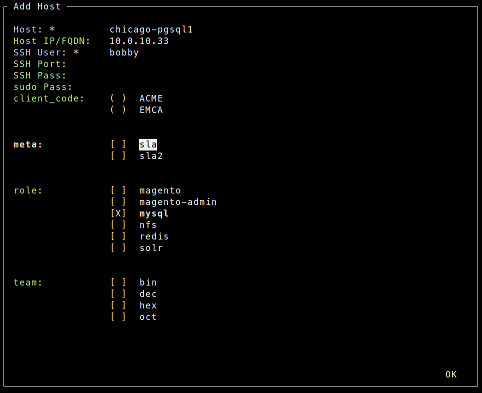dbinbventory is a ansible dynamic inventory script that provides an alternative to .ini file editing. It simplifies and speeds up expanding inventories (host and group management) by combining a CLI UI, JSON I/O, and sqlite storage.
- Python 2.5+
- sqlalchemy
- pycrypto
OPTIONAL - for curses interface
dbinventory.py --db-create
Creates a file named {CWD}/.dbinventory.sqlite3
You may specify the the database location with a --db-path argument ,or, through the DBINVENTORY_PATH environment variable. E.g.
dbinventory.py --db-create --db-path=/ansible/hosts.sqlite3
-- or --
export DBINVENTORY_PATH="/ansible/hosts.sqlite3" && dbinventory.py --db-create
HINT :
by default dbinventory looks for a database file named {CWD}/.{SCRIPT_NAME}.sqlite3.
This is important because it allows you to follow ansible best practices. -- keeping a unique inventory file PER ENVIRONMENT. E.g.
cp dbinventory.py {production.py,staging.py}
./staging.py --db-create --db-import staging/hosts.json
./production.py --db-create --db-import production/hosts.json
./staging.py -e
# will open management interface for hosts backed by ./staging.sqlite3
dbinventory.py --db-import /path/to/data.json
Atomically applies entities from a JSON file. Currently the best method for bulk management. An example file is provided in test-data/initial-data.json.
Additionally, you may export the database data in a format that can be imported:
dbinventory.py --db-export > /path/to/data.json
Hosts and Groups are managed through the JSON I/O arguments, or, a curses interface. E.g.
# spawn the management interface with --edit. requires npycurses library
dbinventory.py -eIn dbinventory, think of "tags" as ansible host groups, and "tag groups" used to taxonomize tags and coherently present them in the curses interface.
You may use dbinventory to generate ssh config files as well.
db-inventory.py --ssh-config >> ~/.ssh/config
cat ~/.ssh/config##### dbinventory hosts #####
#############################
## ACME-db1 groups: ACME, dec, mysql
Host ACME-db1
HostName 8.8.8.9
User roadrunner
## ACME-web1 groups: ACME, dec, magento, redis
Host ACME-web1
HostName 8.8.8.8
User roadrunner
## rabbit-web1 groups: bin, magento, sla
Host rabbit-web1
User bugs
## rabbit-web2 groups: magento
Host rabbit-web2
User bugs
You may store the ssh and sudo password used to interract with a host. Their values are encrypted using an AES symmetric key -- and may only be accessed if dbinventory is called with the --db-secret flag (or the DBINVENTORY_SECRET environmental variable is set). If you do not provide a secret, these fields will not appear in results or be editable in forms.
db-inventory.py --add-host <Host> --db-secret="super secret password"
alternatively, use a persistent environment variable
export DBINVENTORY_SECRET="super secret password"
db-inventory.py --host <Host>
NOTE: The first time dbinventory accesses a database using a secret key, a known value is encoded. Subsequent calls decrypt and test the known value for a match. If your secret does not match the secret stored in the database, dbinventory will complain and exit. This is meant to provent a operator misspellings of the secret, which could result in unretrievable data.
TODO:
- finish tag + group editing
- fix height issue
- allow reselection of edited host/tag
